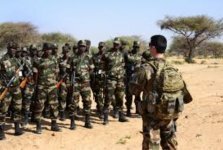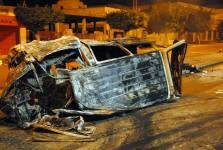KAPALA CHISUNKA, Lusaka OVER 1.6 million Zambians on January 20 went to the polls, which saw the ruling Patriotic Front (PF) candidate Edgar Lungu emerge winner with 807,925 votes representing 48.3 percent.
His closest contender United Party for National Development (UPND) president Hakainde Hichilema got 780,168 votes representing 46.7 percent.
The highly contested presidential elections came as a result of the death of Zambia’s fifth President Michael Sata, who died last year on October 28 at a London hospital.
Other contenders who participated in the election include Forum for Democracy and Development (FDD)’s Edith Nawakwi, who polled 15,321, MMD’s Nevers Mumba (14,609), UNIP’s Tilyenji Kaunda (9,737) and Fourth Revolution’s Eric Chanda garnered 8,054 votes.
Others are NAREP‘s Elias Chipimo, who managed 6,002, Heritage Party’s Godfrey Miyanda with 5,757, Christian Democratic Party (CDP)’s Danny Pule got 3,293 votes, Forum for Democratic Alternative’s (FDA) Ludwig Sondashi had 2,073 and Green Party’s Peter Sinkamba polled 1,410.
None of the nine candidates managed to get one percent of the total vote.
Due to time constraint, the Electoral Commission of Zambia (ECZ) did not register any new voters and used the 2011 voters roll, which had 5,166,084 registered voters.
Of the 5,166,084 registered voters, only 1,671,662 voted. The number of votes rejected was 17,313 while the voter turnout was 32.36 percent. This means that 3,477, 109 eligible voters did not cast their votes for one reason or the other.
This is despite crowds that gathered at many political rallies in the run-up to the January 20 election.
Although many predicted a low voter turnout and apathy to characterise the elections because of the time the polls were being held, the low turnout was disappointing, especially that Zambia’s population is estimated at 14 million and more than half of the total population are eligible voters.
For Zambia, this time of the year is a challenging period to hold elections because of the heavy rains, which subsequently affected transportation of voting materials as most roads become impassable.
The situation in most parts of the country delayed not only the delivery of voting materials but also affected the transportation of election results from various polling stations.
However, generally, the heavy rains seemed to have had no impact on the eagerness by voters to elect their preferred candidate, although some rural communities prefered going into their farming fields instead of the polling stations. The low voter turnout has worried stakeholders including the electoral body.
ECZ chairperson Irene Mambilima said the 2015 elections was the lowest voter turnout the Commission has seen. Justice Mambilima said heavy rains and voter fatigue could have also contributed to voter apathy.
But Zambia Congress of Trade Unions (ZCTU) secretary general Cosmas Mukuka has appealed to Government and ECZ to take the issue of voter apathy seriously, which has continued to characterise national elections.
Mr Mukuka said unless the issue of voter apathy is addressed by the electoral body, the situation will repeat itself even in the 2016 tripartite elections.
“Government and ECZ need to do a research to get to the root cause of why people willingly stayed away from the elections. They should not leave the big portion of voter education to NGOs,” he said.
Mr Mukuka said the church should also be involved in the voter education exercise to ensure that the messages on the importance of voting are understood by all.
“ECZ should work with the church during voter education exercise. In 2011, voter turnout was between 30 and 35 percent and the figures keep dwindling, which is worrisome. We want a situation where a leader is voted into power by a majority vote instead of the minority as it is happening,” he said.
UPND deputy spokesperson Edwin Lifwekelo said one of the major contributions to voter apathy is that many people were disfranchised, especially that ECZ was using the 2011 voters’ roll.
“We feel that the use of the 2011 voters roll might have contributed to low turnout and voter apathy because most people had either relocated or died. It was difficult for them to travel back to where they registered from to vote. And most of them don’t think elections are worth disrupting their lives for,” Mr Lifwekelo said.
He said there is also need for political parties to educate their followers on the importance of voting for their preferred candidates.
“Some people especially those from the security wings and officers from ECZ may not have voted also because they had been deployed to various areas and if they had no special vote; that could have contributed to the low turnout of voters as well,” Mr Lifwekelo said.
MMD leader Dr Nevers Mumba said there is need to establish the reason voter turnout has continued to dwindle.
“ECZ must intensify their voter education campaigns so that people are aware of the importance of exercising their democratic right of voting during elections. There is need for ECZ to go on the ground and find out the causes of voter apathy in the country before the next elections,” he said.
PF secretary general Davies Chama said bad weather, fatigue and farming season could have contributed to voter apathy.
He said some farmers take farming as a priority while others were hindered by the rains to exercise their right to vote.
Mr Chama, however, said the party will soon embark on a sensitisation programme to instill in their members and Zambians the importance of exercising their democratic right to choose a leader of their choice.
And a Lusaka resident, Jenna Zulu, said there was no need for her to go and vote because it was not necessary considering that there will be general elections next year. Ms Zulu said under normal circumstances, the PF should have simply been allowed to choose a candidate to take over from the late president instead of subjecting people to a by-election.
Another resident, a college student Liza Kabwe said she did not vote in the elections because she had no voter’s card.
“I have no voter’s card. I didn’t register in 2011 because I was 16 years old at the time, that’s why I couldn’t vote this time around. I would have loved to vote, so I am really looking forward to voting next year,” she said.
Another student, Jones Phiri, said he did not vote because he had travelled out of town at the time and was not able to come back to vote for his preferred candidate. He is however, excited about the idea of voting in the next elections.
Source





